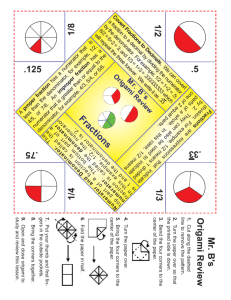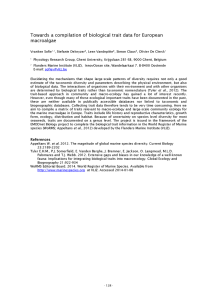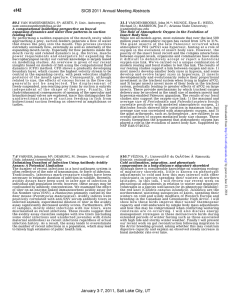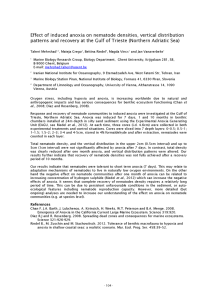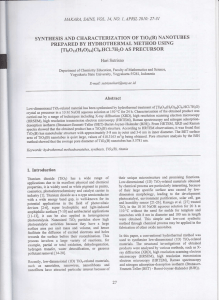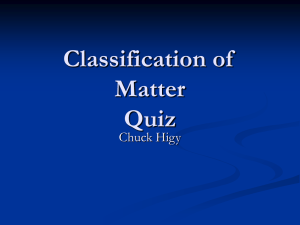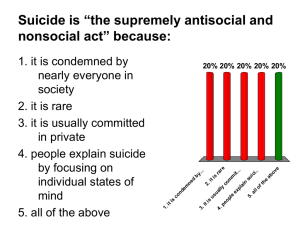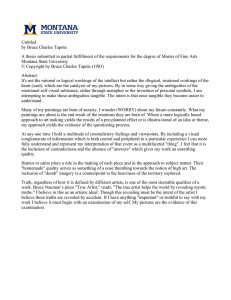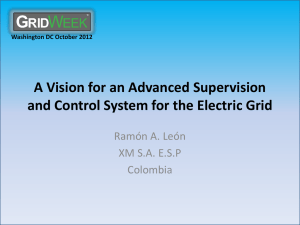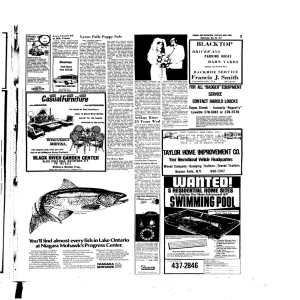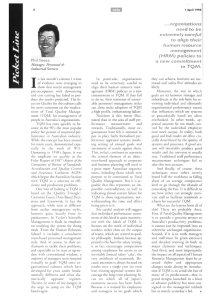e1 SICB 2011 Annual Meeting Abstracts
advertisement
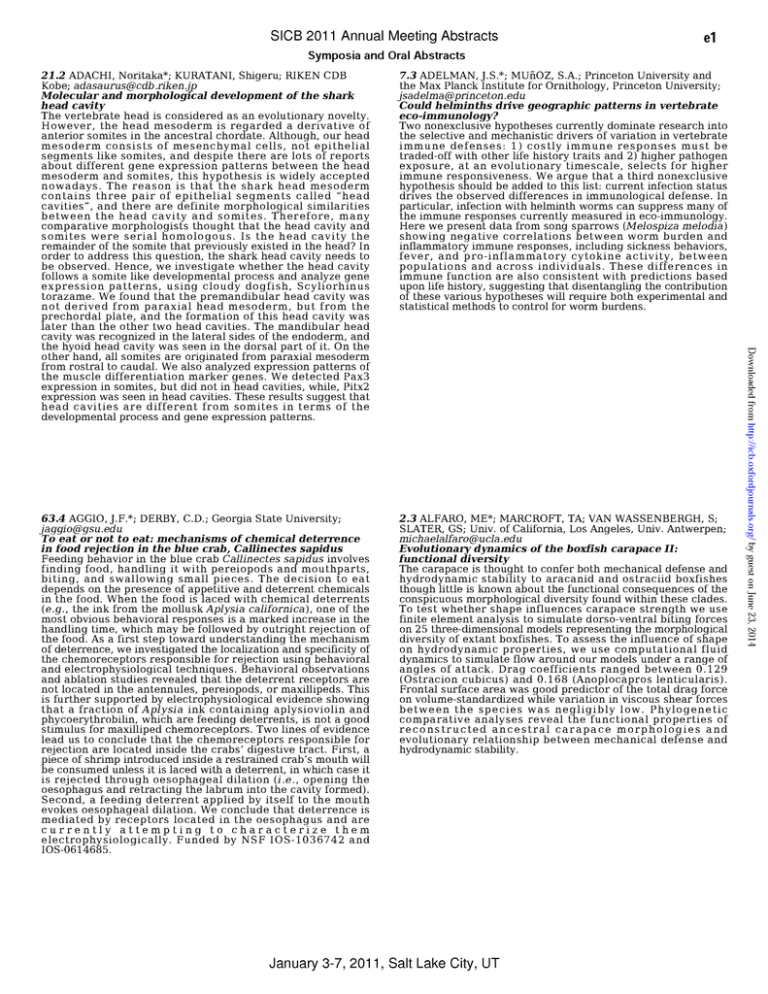
SICB 2011 Annual Meeting Abstracts
e1
Symposia and Oral Abstracts
7 .3 ADELMAN, J.S.*; MUhOZ, S.A.; Princeton University and
the Max Planck Institute for Ornithology, Princeton University;
jsadelm a@ princeton.edu
C o u ld h e lm in th s d r iv e g e o g r a p h ic p a tte r n s in v e r te b r a te
e c o -im m u n o lo g y?
Two nonexclusive hy potheses c u rren tly dom inate r e s e a r c h into
the selective and m echanistic drivers of variation in v e r te b ra te
i m m u n e d e f e n s e s : 1) c o s t l y i m m u n e r e s p o n s e s m u s t b e
trad ed-off w ith o th e r life histo ry tra its and 2) h ig h e r p a th o g e n
exp osu re, at an ev o lutio nary tim escale, se lec ts for h ig h e r
im m u n e r e s p o n s i v e n e s s . We a r g u e t h a t a th ir d n o n ex c lu siv e
hypothesis should be added to this list: c u r r e n t infection status
drives th e o b se rv e d d iffe ren ce s in im m unolog ic al d efe nse. In
particular, infection with helminth worm s can supp ress m any of
th e im m une re sp o n se s c urrently m e a s u r e d in eco-immunology.
H ere we p r e s e n t d a ta from song spa rro w s (M elo sp iza m elo d ía )
s h o w in g n e g a t i v e c o r r e l a t i o n s b e t w e e n w o r m b u r d e n a n d
inflam m atory im m une respon ses, including sickness behaviors,
fev e r, an d p ro -in fla m m a to ry cy to k in e activity, b e tw e e n
p o p u l a t i o n s a n d a c r o s s in d i v i d u a l s . T h e s e d i f f e r e n c e s in
im m u n e f u n c tio n a r e also c o n s i s t e n t w ith p r e d ic tio n s b a s e d
upon life history, suggesting th a t disentangling th e contribution
of th e se various hypo theses will re q u ire bo th experim ental and
statistical m ethods to control for worm burdens.
6 3 .4 AGGIO, J.F.*; DERBY, C.D.; Georgia State University;
jaggio@ gsu.edu
To e a t o r n o t to ea t: m e c h a n is m s o f c h e m ic a l d e te r r e n c e
in fo o d r e je c tio n in th e b lu e c ra b , C a llin e c te s s a p id u s
F eeding beh a v io r in the blue cra b C allinectes sa p id u s involves
f in d in g food, h a n d l i n g it w ith p e r e i o p o d s a n d m o u t h p a r t s ,
b i t i n g , a n d s w a l l o w i n g s m a ll p i e c e s . T h e d e c i s i o n to e a t
dep e n d s on th e p r e s e n c e of appetitive and d e t e r r e n t chemicals
in t h e food. W h e n th e food is la c e d w ith c h e m ic a l d e t e r r e n t s
{e.g., th e ink from th e m ollusk A p ly sia californica), one of th e
m o st obvious b ehavio ral re sp o n se s is a m a rk e d in c re a se in the
h a n d lin g time, w hich m ay be followed by o u tr ig h t r eje ctio n of
th e food. As a first ste p to w a rd u n d e r s ta n d in g th e m e c h a n ism
of deterrence, we investigated the localization and specificity of
th e c h e m o r e c e p to r s resp o n sib le for reje ctio n using behavioral
a n d electro p h y sio lo g ic al te c h n iq u e s. B ehavioral o b se rv a tio n s
an d ab lation studies re v e a le d th a t th e d e t e r r e n t re c e p to r s are
n o t loc ate d in th e antennules, pereiopods, or maxillipeds. This
is f u rth e r s u p p o r te d by electrophysiological evidence showing
t h a t a f r a c t i o n of A p ly s ia in k c o n t a i n i n g a p l y s io v io lin a n d
phycoerythrobilin, w hich a re feeding d e te r re n ts , is n o t a good
stim ulus for maxilliped c h e m o rec ep to rs. Two lines of evidence
le a d us to c o n c lu d e t h a t th e c h e m o r e c e p to r s r e s p o n s i b le for
re je c tio n a re lo c ate d inside th e c r a b s ' digestive tra c t. First, a
piece of shrimp introduced inside a re stra in e d crab 's m o uth will
be consum ed unless it is laced with a deterrent, in w hich case it
is r e j e c t e d t h r o u g h o e s o p h a g e a l d ila tio n (i.e., o p e n i n g th e
o es o p h ag u s an d r e tr a c tin g th e la b ru m into th e cavity formed).
S e c o n d , a f e e d i n g d e t e r r e n t a p p l ie d by its e lf to t h e m o u th
evokes o e s o p h a g e a l dilation. We c o n c lu d e t h a t d e t e r r e n c e is
m e d i a t e d b y r e c e p t o r s l o c a t e d in t h e o e s o p h a g u s a n d a r e
c u r r e n t l y a t t e m p t i n g to c h a r a c t e r i z e t h e m
e l e c t r o p h y s i o l o g i c a l l y . F u n d e d by N S F I O S - 1 0 3 6 7 4 2 a n d
IOS-0614685.
2 .3 ALFARO, ME*; MARCROFT, TA; VAN WASSENBERGH, S;
SLATER, GS; Univ. of California, Los Angeles, Univ. Antwerpen;
m ichaelalfaro@ ucla.edu
E v o lu tio n a ry d y n a m ic s o f th e b o x fish c a r a p a c e II:
fu n c tio n a l d iv e r s ity
The ca rap ac e is th o u g h t to confer b oth m echanical defense and
h y d r o d y n a m i c s ta b ili ty to a r a c a n i d a n d o s tr a c iid b o x fish e s
th o u g h little is known abo u t the functional consequ ences of the
conspicuous morphological diversity found within th e se clades.
To t e s t w h e t h e r s h a p e in f lu e n c e s c a r a p a c e s t r e n g t h w e u s e
finite e le m e n t analysis to sim u late do rso -v e n tral biting forces
on 25 three-dimensional models r ep rese n tin g the morphological
diversity of e x ta n t boxfishes. To a s s e s s th e influence of sh a p e
on h y d r o d y n a m i c p r o p e r t i e s , w e u s e c o m p u t a t i o n a l f lu id
dynamics to sim ulate flow aro u n d our m odels u n d e r a r a n g e of
a n g l e s of a t t a c k . D ra g c o e f f ic ie n ts r a n g e d b e t w e e n 0 .1 2 9
( O s tr a c i o n c u b ic u s) a n d 0 .1 6 8 ( A n o p lo c a p ro s l e n tic u la r is ) .
Frontal surface a r e a was good p re d ic to r of th e total d ra g force
on v olum e-standard ized while variation in viscous s h e a r forces
b e t w e e n t h e s p e c i e s w a s n e g l i g i b l y lo w . P h y l o g e n e t i c
c o m p a r a t i v e a n a l y s e s r e v e a l t h e f u n c t i o n a l p r o p e r t i e s of
r e c o n s tr u c te d a n c e s tra l c a ra p a c e m o rp h o lo g ie s and
e v o l u tio n a r y r e l a t i o n s h i p b e t w e e n m e c h a n i c a l d e f e n s e a n d
hydrodynamic stability.
January 3-7, 2011, Salt Lake City, UT
Downloaded from http://icb.oxfordjournals.org/ by guest on June 23, 2014
2 1 .2 ADACHI, Noritaka*; KURATANI, Shigeru; RIKEN CDB
Kobe; adasaurus@ cdb.riken.jp
M o le c u la r a n d m o r p h o lo g ic a l d e v e lo p m e n t o f th e s h a r k
h e a d c a v ity
The v e r t e b r a t e h e a d is c o n s id e re d as a n evolutionary novelty.
H o w e v e r , t h e h e a d m e s o d e r m is r e g a r d e d a d e r i v a t i v e of
a n te r io r som ites in th e an c e s tra l cho rdate. Although, o u r h e a d
m e s o d e r m c o n s i s t s of m e s e n c h y m a l c e lls , n o t e p i t h e l i a l
s e g m e n t s like so m ites, a n d d e s p ite t h e r e a r e lots of r e p o r t s
a b o u t d if f e r e n t g e n e e x p r e s s i o n p a t t e r n s b e t w e e n t h e h e a d
m e s o d e r m a n d s o m i te s , th is h y p o t h e s i s is w id e ly a c c e p t e d
n o w a d a y s . T h e r e a s o n is t h a t t h e s h a r k h e a d m e s o d e r m
c o n t a i n s t h r e e p a i r of e p i t h e l i a l s e g m e n t s c a l l e d " h e a d
c a v itie s " , a n d t h e r e a r e d e f in ite m o r p h o lo g ic a l s im ila rit ie s
b e tw e e n th e h e a d c a v ity a n d so m ite s. T h e r e f o r e , m any
c o m p a r a tiv e m o rp h o lo g is ts th o u g h t t h a t th e h e a d cavity an d
s o m i t e s w e r e s e r i a l h o m o l o g o u s . Is t h e h e a d c a v i t y t h e
r e m a in d e r of th e somite th a t previously existed in th e h ea d? In
o r d e r to a d d r e s s this question, th e sh a rk h e a d cavity n e e d s to
b e o b se rv e d . H en c e, w e in v e s tig a te w h e t h e r th e h e a d cavity
follows a som ite like dev e lo p m e n ta l p ro c e ss and analyze gene
e x p r e s s io n p a t te r n s , u sin g clo ud y d o gfish , S cy lio rh in u s
to r a z a m e . We found t h a t t h e p r e m a n d i b u l a r h e a d cavity w as
n o t d e riv e d fro m p a ra x ia l h e a d m e s o d e rm , b u t from th e
p r e c h o r d a l p la te , a n d t h e f o r m a tio n of th is h e a d ca v ity w as
l a t e r t h a n th e o t h e r tw o h e a d cavities. T he m a n d ib u la r h e a d
cavity was recognized in th e la teral sides of th e endoderm , and
th e hyoid h e a d cavity w as s e e n in th e do rsal p a r t of it. On the
o th e r hand, all somites are originated from paraxial m e so d erm
from r o stra l to caudal. We also analyzed expression p a tte r n s of
t h e m u s c le d if f e r e n tia tio n m a r k e r g e n e s. We d e t e c t e d Pax3
expressio n in somites, b u t did n o t in h e a d cavities, while, Pitx2
expression was seen in h ead cavities. These results sugge st th a t
h e a d c a v i t i e s a r e d i f f e r e n t f r o m s o m i t e s in t e r m s of t h e
developmental process and gene expression patterns.
